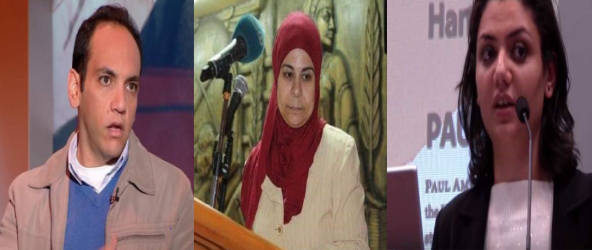The disciplinary committee at the Higher Technological Institute in Egypt’s 10th of Ramadan city punished his assistant professor of Mechanical Engineering, Manar Tantawi, with a 15-day deduction from her salary. “Tantawi appeared in hostile TV channels that distort the country and harm the institute’s and the administration’s images,” said the institute’s statement pointing to Tantawi’s participation 3-year ago in a sit-in broadcasted by opponent Egyptian TV channels abroad. The sit-in demanded the release of Tantawi’s husband, Hisham Gaafar, the well-known researcher and journalist detained for 41 months before being released in April 2019.
The decision coincided with a court ruling obligating the President of Cairo University and the Dean of Cairo Medical Faculty to return the political activist Shadi Al-Ghazali Harb to his work as an assistant professor in the faculty of medicine. Harb went to court after the university refused to return him to his position after he was detained for two years between 2018 and 2020. The decisions reflected the politicization of universities in Egypt as the administrations used to punish opponent academics over the past few years.
From the first day of his mandate, General Abdel Fattah al-Sisi showed interest in controlling universities as strongholds of the opposition activities. One of his first decisions was to cancel the decision of choosing deans of universities and faculties by elections among the academic staff, which was issued and implemented after the January Revolution to boost the independence and freedom of scholarly work in Egypt. Moreover, a security agency approval was also conditioned for any person to be employed in an academic position.
The security approval and the president’s authority to nominate the presidents of universities breach the Egyptian Constitution that provides in article 21 the states have to guarantee the independence of universities and the scientific and linguistic academies. The governmental invasion of Egyptian universities went on after the authorities prevented universities from holding or hosting any international conference or signing protocols or agreements with foreign universities without obtaining approvals from the Ministry of Foreign Affairs and the regulatory and security authorities.
Academic staff travel to study or attend conferences abroad was also conditioned on security permission, which wasted many opportunities for researchers and university professors whose journey was not approved by the security. For example, in 2017, under a security injunction, Cairo University refused to renew the study permission of researcher Kholoud Saber, assistant teacher of psychology, to complete her PhD at the Catholic University of Louvain in Belgium.
The most striking step, however, came when the authorities started to write off scientific theses that did not conform with the views and directions of the regime. In 2015, Suez Canal University wrote off two scientific ideas, the first titled, “Democracy between thought and practice in the Muslim Brotherhood and Salafists: an analytical study of the Freedom and Justice and Al-Nour parties,” and the second, “The Muslim Brotherhood and the Egyptian Parliamentary elections 2005.” University officials said both theses contradict “the public order of the state” and “the provisions of courts” and suspended supervisors of the ideas to investigate them. Such recurrent violations led Egypt down in the international academic rankings. For example, the Academic Freedom Index in March 2021 ranked Egypt among the worst category for academic freedom, after China, Iran and Yemen.





Recent Comments